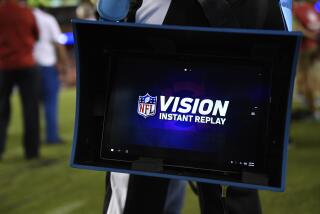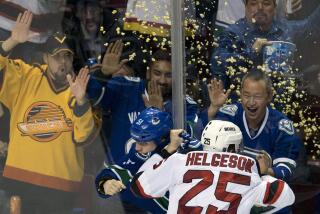NHL Notes : McSorley Incident May Alter Rules
- Share via
Some changes are certain to be made in the National Hockey League rule book, and possibly in the overall officiating system, as a result of the Marty McSorley incident Saturday in Edmonton.
McSorley was credited with an assist on a goal that was scored by teammate Charlie Huddy after McSorley had viciously speared Mike Bullard of Calgary.
The foul, which took place near the team benches and away from the play, was noted by the trailing official, linesman Gord Broseker, but he lacked the authority to blow his whistle to halt play.
After the goal was scored, Broseker notified referee Andy Van Hellemond, who assessed McSorley a major penalty for spearing and the automatic game misconduct that accompanies it. However, since the goal was scored before play was halted, it was allowed to stand.
NHL officials explained that a goal can be disallowed after the fact only in two circumstances. One would be the upholding of a challenge on an illegal stick used in a penalty shot; the other would be if a team was found to have too many men on the ice when it scored.
Although rule 36(f) authorizes the referee to “give the final decision in matters of disputed goals,” the officials do not consider that a blanket authority to change the procedure.
Common sense would dictate that the goal be disallowed, but the NHL is known to be on unfriendly terms with common sense on occasion. For example, goals scored exactly two minutes after the assessment of a penalty are not considered to be power-play or shorthanded scores, although obviously the penalized player is still in the box.
In a similar vein, common sense would have seemed to dictate that McSorley be kept out of Monday night’s 6-4 win over the Flames.
Brian O’Neill, the NHL’s executive vice president, flew from Montreal to the Meadowlands Sunday for a hearing into the relatively innocuous match penalties issued Washington’s Greg Smith and New Jersey’s Brendan Shanahan for a brief stick-swinging incident Friday. However, no such urgency was visible in the far more volatile McSorley situation.
A league spokesman explained: “It is important to deal with a match penalty as quickly as possible. Possible discipline involving a major penalty requires a thorough investigation, with tapes sent to the league office and reports gathered from several sources.”
McSorley has since been suspended three games for the playoffs.
The Smith-Shanahan incident was closed Monday, with Shanahan fined the maximum $500 permissible under the owner-player agreement and Smith assessed $300. Shanahan was adjudged to have swung his stick first, striking Smith in the neck. Smith swung back, but did not make contact.
The verbiage that has accompanied the rough play in the Washington-New Jersey series is straight from Miss Manners compared with the harsh words emanating from Montreal and Boston.
After the Bruins’ Michael Thelven slashed the Canadiens’ Stephane Richer, breaking his left thumb, Montreal Coach Jean Perron called it “a vicious act, something that should not be tolerated. We’ll double our protection. We won’t go to war with slingshots.”
Asked if he felt the slash was “vicious,” Thelven, a Swede, asked, “What does that mean?”
Jacques Demers, the unqualified optimist who coaches the Detroit Red Wings, said, “I think we can win the Stanley Cup. Just look at our record against the teams that are left.”
Perusal of the regular-season results uncovered the fact that Demers was not just blowing smoke. The Red Wings were 15-6-5 against the seven other quarterfinalists.
Detroit’s chances will be enhanced if center Steve Yzerman, its captain and 50-goal scorer, can return for the Campbell Conference final. Yzerman suffered a severe knee injury March 1 and was believed lost for the season, but he has worked hard on rehabilitation.
If it concerned any team except Toronto, the following story would be discounted. But Al Strachan of the Toronto Globe and Mail vouches for its veracity.
More than a year ago, owner Harold Ballard gave permission to his general manager, Gerry McNamara, to fire Coach John Brophy. Ballard just asked a day’s delay so he could leave town and avoid the repercussions.
The next day, McNamara carried the pink slip to Brophy, but made the mistake of going to the wrong rink. The Maple Leafs were practicing elsewhere, Brophy got wind of what was coming and persuaded Ballard to reverse the decision.
In February, it was McNamara who was fired, with Brophy given an increased role in the club’s mismanagement.
More to Read
Go beyond the scoreboard
Get the latest on L.A.'s teams in the daily Sports Report newsletter.
You may occasionally receive promotional content from the Los Angeles Times.






